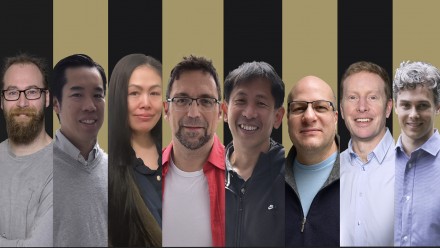Associate Professor Anne Bruestle

Contacts
Anne Bruestle has been a Group Leader in the JCSMR Department of Immunology and Infectious Disease since mid 2014. She completed her PhD at the Institute of Medical Microbiology, at Philipps-University in Marburg, Germany. She focused on investigating T helper (h) cell differentiation in the interferon regulatory factor (IRF) 4 deficient mouse. Her major accomplishment was the identification of IRF4 as a required transcription factor for the differentiation of Th17 cells. She spent the following years as a Postdoctoral Fellow in Dr Tak Mak's laboratory in Toronto, Canada, where she combined her experience in the field of T helper cell differentiation to related autoimmune disease mouse models, as well as extended her expertise into different aspects of immunology. Now as a group leader at JCSMR, her goal is to combine in vitro findings with in vivo studies using animal models for multiple sclerosis (MS) as well as for inflammatory bowel disease (IBD), bacterial infections and psoriasis. Of particular interest to Anne are the mouse model of MS, experimental autoimmune encephalomyelitis (EAE) and its disease associated T cell subset Th17.
Research interests
The Bruestle Group - Inflammatory T Cell Responses, is focusing on different T helper cell subsets and how they modulate immunity in diverse autoimmune mouse models. A special interest of this group is the CD4 subset of inflammatory Th17 cells. Using genetically modified mouse strains they analyse the differentiation and effector function of these cells in vitro as well as in in vivo models. Their research relates to human autoimmune diseases such as multiple sclerosis, psoriasis or inflammatory bowel disease, all of which have been associated to deregulated Th17 cell responses.
Enquiries are welcome from potential Honours or PhD students with an interest in autoimmunity and T cell biology. A variety of projects are available within all areas of research undertaken by this Group. Contact Anne via email or phone +61 2 612 59009.
Groups
Projects
Selected Publications:
- Brüstle A*, Brenner D*, Knobbe-Thomsen CB, Cox M, Lang PA, Lang KS and Mak TW (2015) MALT1 is an intrinsic regulator of regulatory T cells. Cell Death Differ doi: 10.1038/cdd.2015.104. [Epub ahead of print]
- Harris IS, Treloar AE, Inoue S, Sasaki M, Gorrini C, Lee KC, Yung KY, Brenner D, Knobbe-Thomsen CB, Cox MA, Elia A, Berger T, Cescon DW, Adeoye A, Brüstle A, Molyneux SD, Mason JM, Li WY, Yamamoto K, Wakeham A, Berman HK, Khokha R, Done SJ, Kavanagh TJ, Lam CW and Mak TW (2015) Glutathione and thioredoxin antioxidant pathways synergize to drive cancer initiation and progression. Cancer Cell 27(2):211-22. doi: 10.1016/j.ccell.2014.11.019
- Brüstle A (2015) Is DUBA putting the brake on Th17 cells? Immunol Cell Biol 93:111–112 doi: 10.1038/icb.2014.111
- Brenner D*, Brüstle A*, Lin GH, Lang PA, Duncan GS, Knobbe-Thomsen CB, St Paul M, Reardon C, Tusche MW, Snow B, Hamilton SR, Pfefferle A, Gilani SO, Ohashi PS, Lang KS and Mak TW (2014) Toso controls encephalitogenic immune responses by dendritic cells and regulatory T cells. Proc Natl Acad Sci USA 111(3):1060-5
- Brüstle A*, Brenner D*, Knobbe CB, Lang PA, Virtanen C, Hershenfield BM, Reardon C, Lacher SM, Ruland J, Ohashi PS and Mak TW (2012) The NF-kB regulator MALT1 determines the encephalitogenic potential of Th17 cells. J Clin Invest 122(12):4698-709
- Sasaki M*, Knobbe CB*, Munger JC, Lind EF, Brenner D, Brüstle A, Harris IS, Holmes R, Wakeham A, Haight J, You-Ten A, Li WY, Schalm S, Su SM, Virtanen C, Reifenberger G, Ohashi PS, Barber DL, Figueroa ME, Melnick A, Zúñiga-Pflücker JC and Mak TW (2012) IDH1(R132H) mutation increases murine haematopoietic progenitors and alters epigenetics. Nature 488(7413):656-659
- Bollig N, Brüstle A, Kellner K, Ackermann W, Abass E, Raifer H, Camara B, Brendel C, Giel G, Bothur E, Huber M, Paul C, Elli A, Kroczek RA, Nurieva R, Dong C, Jacob R, Mak TW and Lohoff M (2012) Transcription factor IRF4 determines germinal center formation through follicular T-helper cell differentiation. Proc Natl Acad Sci USA 109(22):8664-9
- Reardon C*, Lechmann M*, Brüstle A, Gareau MG, Shuman N, Philpott D, Ziegler SF and Mak TW (2011) Thymic stromal lymphopoetin-induced expression of the endogenous inhibitory enzyme SLPI mediates recovery from colonic inflammation. Immunity 35(2):223-35
- Huber M, Brüstle A, Reinhard K, Guralnik A, Walter G, Mahiny A, von Löw E and Lohoff M (2008) IRF4 is essential for IL-21-mediated induction, amplification and stabilisation of the TH17 phenotype. Proc Natl Acad Sci USA 105(52):20846-51
- Brüstle A, Heink S, Huber M, Rosenplänter C, Stadelmann C, Yu P, Arpaia E, Mak TW, Kamradt T and Lohoff M (2007) The development of inflammatory T(H)-17 cells requires interferon-regulatory factor 4. Nat Immunol 8(9):958-66
* Authors contribute equally











